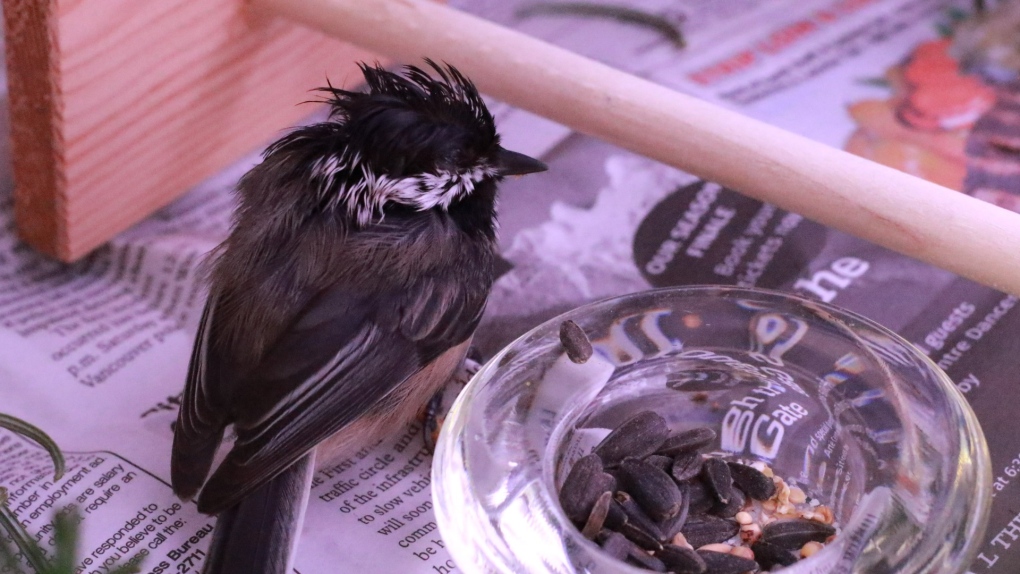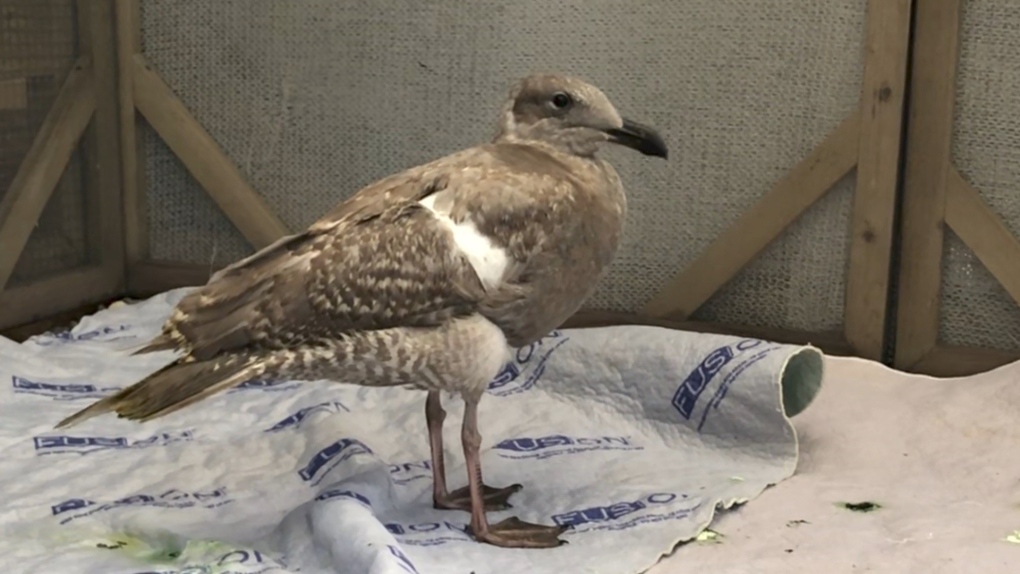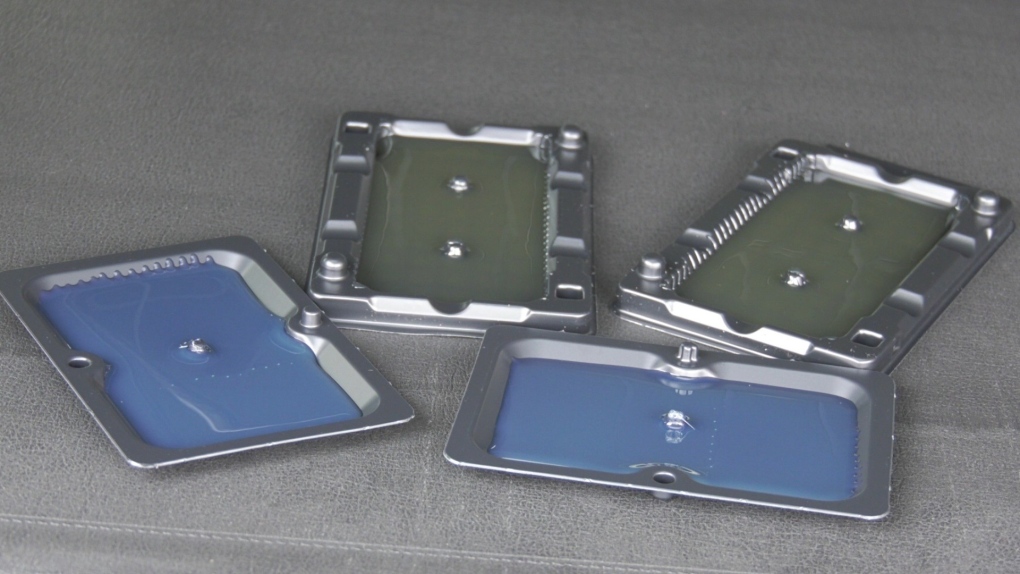Glue trap warning: B.C. wildlife rescue group seeing birds, bats getting caught
The Wildlife Rescue Association of B.C. is issuing a warning about the use of glue traps, after seeing an uptick in admissions related to the pest control method.
The association’s co-executive director Linda Bakker said they’ve had a “number of birds and bats” that have gotten stuck, and have required rescue.
“As soon as an animal gets trapped, instinct kicks in and it will try to escape. So it might pull, it might roll over, so it gets all over their body,” she said. “They require specialized care to be able to survive.”
Bakker said this year, the association has seen over 30 intakes related to glue traps. One recent case involved a crow, which had its feathers coated with the sticky substance.
Bakker said the people who found the crow called the association’s helpline at their support centre, which is available from 9 a.m. to 3:30 p.m., seven days a week.
“They didn’t remove the crow themselves, so that’s really important,” she said. “Do not try to remove the animal yourself. It often leads to more damage, and if the bird or other animal does get away – then we cannot help it anymore and it might not survive on its own.”
The crow was brought to the organization's rescue centre in Burnaby, where the trap was removed. Then staff used a special process to clean the bird’s feathers. Ultimately, the crow was able to be released.
RISKS TO BIRDS, BATS
Bakker said they have seen many different species caught in glue traps, which are available at hardware stores. The traps themselves consist of a plastic tray, filled with a thick, sticky glue.
“A lot of songbirds forage on the ground for little seeds, so they just hop around and hop on the tray,” she said. “We have a gull in care right now. They are attracted because they are curious, they check things out. It might look like a food tray.”
 The Wildlife Rescue Association of B.C. is issuing a warning that the use of glue traps is dangerous for birds and bats.
The Wildlife Rescue Association of B.C. is issuing a warning that the use of glue traps is dangerous for birds and bats.
Bakker noted the traps can also cause other injuries.
“Sometimes they do jerk around so much, that they rip feathers out, or open their skin, or even break bones, or they’re in the trap longer than a day and then immediately they get dehydrated and emaciated,” she said. “If the damage is too extensive, there’s nothing we can do. If they’re severely emaciated, it’s really difficult to turn that around.”
 The Wildlife Rescue Association of B.C. is issuing a warning that the use of glue traps is dangerous for birds and bats.
The Wildlife Rescue Association of B.C. is issuing a warning that the use of glue traps is dangerous for birds and bats.
Bats can also unintentionally fall victim to the traps.
“Bats can often get stuck on a glue trap that’s meant for insects. So in barns, people put out glue traps that are hanging down,” Bakker said. “They do attract insects, insects get stuck on them, but it also then attracts bats to go after the insects and then get stuck themselves.”
ALTERNATIVES TO GLUE TRAPS
Bakker suggests looking for longer-term solutions when dealing with a rodent or pest problem.
“Look at your house and find the areas where these animals come into your house and block those off,” she said. “There are other traps available, but also you could contact a pest control company and then preferably one that’s AnimalKind certified. The BC SPCA has a certification for pest control companies to make sure animal welfare and wildlife welfare is guaranteed.”
Bakker said the fall usually sees an increase in these types of cases, as rodents are looking to move inside to get warm, or to find food.
“Even if you get mice in your trap that it was intended for, the mouse is still alive and on the trap, so then you have to deal with it, and it’s not very humane. The animal is suffering, basically,” she said. “I would like to see these traps removed from the stores.”
Anyone who does find wildlife stuck on a glue trap can also try to use paper towel to cover any remaining exposed areas of the trap, so the creature cannot become even more stuck. The Wildlife Rescue association recommends putting the animal or bird in a covered box or container, and keeping them in a quiet place until they can be brought in for medical help.
The association’s help line can be reached at 604-526-7275.
 The Wildlife Rescue Association of B.C. is issuing a warning that the use of glue traps is dangerous for birds and bats.
The Wildlife Rescue Association of B.C. is issuing a warning that the use of glue traps is dangerous for birds and bats.
CTVNews.ca Top Stories

Trudeau noncommittal on expanding rebate beyond 'working Canadians'
Prime Minister Justin Trudeau does not appear willing to budge on his plan to send a $250 rebate to 'hardworking Canadians,' despite pressure from the opposition to give the money to seniors and people who are not able to work.
'Mayday!': New details emerge after Boeing plane makes emergency landing at Mirabel airport
New details suggest that there were communication issues between the pilots of a charter flight and the control tower at Montreal's Mirabel airport when a Boeing 737 made an emergency landing on Wednesday.
Cucumbers sold in Ontario, other provinces recalled over possible salmonella contamination
A U.S. company is recalling cucumbers sold in Ontario and other Canadian provinces due to possible salmonella contamination.
Latest updates: Tracking RSV, influenza, COVID-19 in Canada
As the country heads into the worst time of year for respiratory infections, the Canadian respiratory virus surveillance report tracks how prevalent certain viruses are each week and how the trends are changing week to week.
Weekend weather: Parts of Canada could see up to 50 centimetres of snow, wind chills of -40
Winter is less than a month away, but parts of Canada are already projected to see winter-like weather.
W5 Investigates A 'ticking time bomb': Inside Syria's toughest prison holding accused high-ranking ISIS members
In the last of a three-part investigation, W5's Avery Haines was given rare access to a Syrian prison, where thousands of accused high-ranking ISIS members are being held.
Federal government posts $13B deficit in first half of the fiscal year
The Finance Department says the federal deficit was $13 billion between April and September.
Armed men in speedboats make off with women and children when a migrants' dinghy deflates off Libya
Armed men in two speedboats took off with women and children after a rubber dinghy carrying some 112 migrants seeking to cross the Mediterranean Sea started deflating off Libya's coast, a humanitarian aid group said Friday.
Nick Cannon says he's seeking help for narcissistic personality disorder
Nick Cannon has spoken out about his recent diagnosis of narcissistic personality disorder, saying 'I need help.'

































